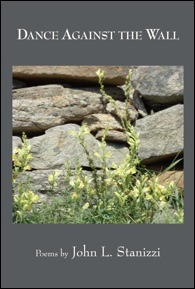John L. Stanizzi’s fourth poetry collection, Dance Against the Wall, will stun readers into a fuller livelihood of the heart. Fearful pain and self-incrimination are here, but in the end it is love and a sense of the brotherhood among all living creatures, human and animal, that inform the book.
I love a poet whose eye and ear miss nothing. John Stanizzi’s new book demonstrates that skill over and over in perfect evocations of memories large and tiny, exotic and mundane. His poems are not just accessible but inviting, deceptively casual even when formal. At the heart of this book is family, both blood and extended, and few poems explore it so well, so honestly. Here the family includes all of the natural world as well, and descriptions and stories whose exquisite details not only captured but enlarge. The poems collected here beg to be re-read to be savored.
-Steve Straight — author of The Almanac
John Stanizzi’s Dance Against the Wall celebrates our most deeply felt human experiences of love of family and of the natural world that take place, as they must, within the limitations of our mortal and fallible, error prone lives. Painfully aware of the contradictory truths we live with each day, these poems trace both the losing fight to bring back a father’s loss of memory and those vestigial moments of clarity when the father is “doing alright,” the knowledge that getting into the National Guard to avoid getting sent to Vietnam means that someone else will be sent in your place; the painful acknowledgement that the lies we create to manipulate our lives also keep us from what is most genuine; and, finally, that our task is simply to carry on as best we can so our loved dead (whose voices can be heard in our own voices) are kept alive “in everything we say.” Dance Against the Wall is filled with unflinching, passionately honest, brave, well-crafted poems that openly acknowledge the sorrows and dangers of living while simultaneously fighting to keep safe all that Stanizzi holds dear. In the end, his always self-aware poems contain a tender, hard-earned sense of transcendence.
– Robert Cording , author of Walking with Rushkin
The word that keeps coming to mind when I am reading John Stanizzi poems is “realization,” not in the sense of seeming reality to things that were only imagined, but in the sense of seeing the realness of what is really there, and bringing it to his reader (and to himself) so generously in the directness and vividness of his sentences and the authority of his writing. This book has all the virtues of his previous book , Ecstasy Among Ghosts, registering his Hartford, it’s river, the vividly rendered family, and the vividly rendered presence of himself in these poems, so that all comes fully alive — perhaps, in this new book, with even more intensity realization and love.
– David Ferry — author of Of No Country I Know
TATTOOS
Unlike the other men in the family, my father
has no chains or skunks with attitude,
or his last name over crossed Italian flags,
no Mom or Born to Ride or broken heart,
no Semper Fi, no naked ladies or dice.
My father has no Jolly Rogers or devils,
no angels, crosses, lions, dragons, or knives.
He has no rosary beads or praying hands,
no Virgin with child, U.S. Army or dove.
My father has no Sacred Heart of Jesus.
But on the inside of his left forearm
there’s one tattoo no bigger than a signature
and the same shade of faded blue as the bruises
that blossom on his papery yellow skin,
and as he sits in his big reclining chair,
smiling vaguely and squeezing a stuffed toy,
I glimpse the washed-out ink that tells the story
Johnny and Dolly, faded and just about gone.
-Published in Combustus – ‘Adjustment’ — 2008
DLROW
The first test they give him
is to see if he can spell
world backwards,
which he can, easily ~
such demeaning, useless exercises
at Yale,
Mecca of miracles
where she is sure
they’ll give him a pill one day
to reverse it all
and bring him back.
But for now
no matter the day of the week,
his birth date,
the season,
the one thing he knows for sure
is that the world is backwards,
and it will be that way from now on.
-Published in Rhubarb (Canada) – Summer, 2011
